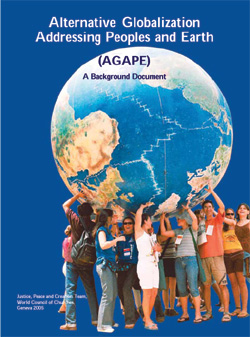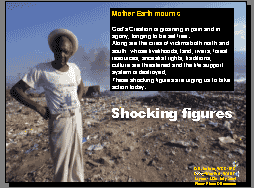
| justice,
peace & creation concerns "Globalization understood as increasing internationalization of ideas, science, communication and technology, must be distinguished from economic globalization, which transforms trade and finance in favour of powerful global actors." "How do we live our faith in the context of globalization?" the WCC's 1998 assembly in Zimbabwe asked, thereby challenging the Council and its member churches to offer clear analysis and critiques as well as alternatives to globalization - in terms of the neo-liberal paradigm, trade, finance and ecology -, as well as to explore the political, cultural, and ecclesiological dimensions of globalization. Thus began a journey of churches and their partners that will culminate at the next WCC assembly in 2006 in Porto Alegre, Brazil. The journey is called AGAPE: "Alternative Globalization Addressing People and Earth". With clear guidelines from the January 2001 WCC Central Committee meeting in Berlin, it is being coordinated by the Justice, Peace and Creation team. Human development within sustainable communities is the vision guiding the WCC’s approach to economic globalization. Such a vision can become reality only when economic, financial and ecological justice are addressed holistically with democratic participation at all levels. |
AGAPE: "Alternative Globalization Addressing People and Earth" Geneva, 7-9 September 2006 |
Life – and that which is essential to sustain it – cannot be commodified. Real value goes far beyond what can be expressed in monetary terms. Human beings are made in the image of God, and human life finds its full meaning in community. Yet the dominant worldview underlying economic globalization characterizes humans as competitive individuals rather than as community members. By undermining essential spiritual values, globalization has eroded the moral and ethical fabric of society, putting the diversity of cultures at risk and threatening the ecological basis of life, eating at the very heart of sustainable communities. Justice is the heart of the matter. All people and communities should participate in the economic, social and political decisions that affect them, and the aim of economic life should be to nurture sustainable, just and participatory communities. What is needed is the globalization of solidarity: the affirmation of our common destiny as co-inhabitants of one Earth, for which we all share responsibility and from which everyone should equitably benefit. In
order to carry forward the AGAPE process, the JPC team is attempting
to
|
| Finance A new type of capitalism has emerged in which technology and communication facilitates lightning-fast trading in financial assets across borders. It is characterized by financial speculation, international debt and inequitable world trade. Speculation |
|
|
|
Because
speculators go for quick returns, they are not interested in investing
in companies which create employment but yield slow returns. Excessive
speculation leads to financial volatility and in many cases contributes
to chronic indebtedness. To solve this problem, some churches are
campaigning for a Currency
Transaction Tax (CTT) aimed at discouraging
excessive speculation, enhancing exchange stability and creating
revenue which can be used to finance poverty alleviation and social
projects. Up to now, this tax has not been enforced. The UN was
asked to conduct a study on the practicality of this tax during
the Geneva Summit on Social Development+5 in 2000.
Debt
Since its inception in 1996, the Highly Indebted Poor Countries
(HIPC) Initiative has been subjected to stalling and delays. To
date only 10 out of the 40 countries on the HIPC list have seen
actual reductions in their debt repayments. This reduction was not
sufficient to pull these countries out of the cycle of poverty.
A new condition demands that HIPCs produce "Poverty Reduction
Strategy Papers" with the participation of civil society. At
the rate at which the Initiative is being applied, it will take
more than 15 years to provide relief to the 40 highly-indebted poor
countries. Churches are called to suggest alternatives to current short-term debt relief initiatives. The WCC/JPC supports the efforts of NGO coalitions - Jubilee South and other Jubilee 2000 movements - to implement their new proposals. A group of theologians, economists, sociologists and ecologists have produced a background document for the churches on how they can respond to the policies of International Financial Institutions. This document is called "Lead Us Not Into Temptation: Churches' Response to the Policies of International Financial Institutions". A joint group of staff from the WCC, the World Bank and IMF has organized two joint encounters on the neo-liberal economic paradigm; wealth and social justice, and debt. The reports are in form of books. An internal encounter on the policies of the World Bank and IMF was organized for churches and agencies in September 2003 and produced a book entitled "Passion for another world". Another seminar on Illegitimate Debt and Arbitration was organized by WCC in June 2003 to assess where we are in solving the debt problem: A report entitled "The Debt Problem for Poor Countries: Where are We?" was produced.
|
||
|
Trade
In
seeking economic justice, we have chosen to focus on how multilateral
trade can be carried out in ways that promote justice, human development,
and ecological sustainability. Trade is a basic act in any society. We accept that trade can bring about good in our world. An exchange between parties, if fair, can be of mutual benefit and increase human wellbeing. But trade on unequal terms is damaging, creates and maintains inequities, and can lead to violence and conflict. Trade should be a means to share the bounty of the earth and the fruits of human labor, yet too often it is a force that produces poverty, despair, injustice and death. Current global trading systems are dominated by a few economic powers – including rich country governments, transnational corporations, stock markets and multilateral institutions – whose control of capital, technology, political influence, cultural persuasion through the international media, and military influence are overwhelming and preclude access to the global market on an equitable basis. Within poor countries, powerful elites reap the benefits of economic globalization, while billions of their people remain in abject poverty. International trade and its liberalization provide the means by which power and advantage are translated into disproportionate wealth for some, while inequalities between countries and within countries continue to widen and vulnerable people are further marginalized. Most poor countries and their people do not benefit much from world trade. About 360 transnational corporations currently account for 40% of world trade and their production centres and sales networks cover the world, both rich and poor. Although some Northern states exercise some, and Southern states less, control over them, TNCs possess enormous potential for building monopolies and are able easily to overcome trade barriers. For historical and structural reasons, developing countries require special consideration and assistance to be able to participate equitably in world trade. This would include protective tariffs for developing country exports to developed country markets. Increasingly, the rich countries continue to subsidise their farmers and also make it difficult for accessibility of their markets by the developing countries. The World Trade Organization (WTO) is still dominated by the developed countries and is not helpful to the developing countries. At its 45 meetings a week, poor countries are neither sufficiently skilled or resourced to carry out effective trade negotiations. Civil society is now proposing the development of just, pluralistic trade organizations interacting with one another amidst broadly defined and flexible. The issues of low prices for products from developing countries requires further studies and analysis. |
|



